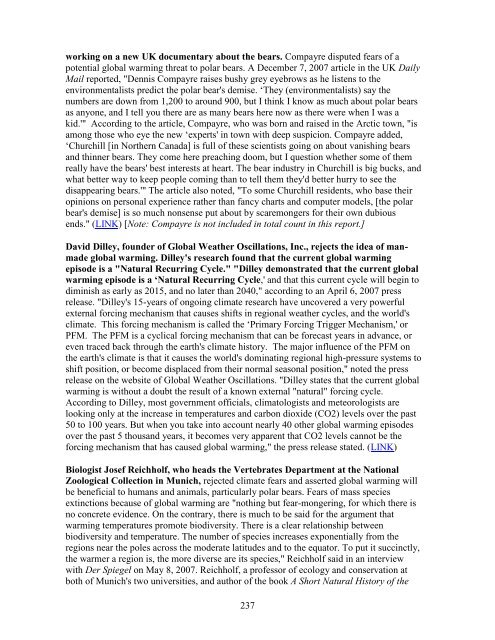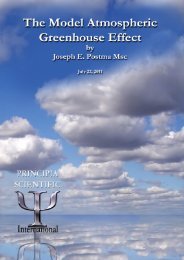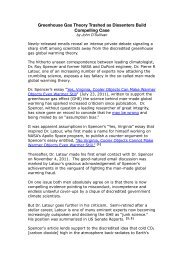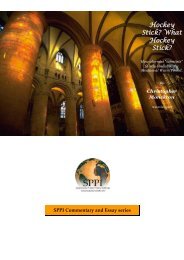Than 1000 International Scientists Dissent Over Man-Made Global ...
Than 1000 International Scientists Dissent Over Man-Made Global ...
Than 1000 International Scientists Dissent Over Man-Made Global ...
You also want an ePaper? Increase the reach of your titles
YUMPU automatically turns print PDFs into web optimized ePapers that Google loves.
working on a new UK documentary about the bears. Compayre disputed fears of a<br />
potential global warming threat to polar bears. A December 7, 2007 article in the UK Daily<br />
Mail reported, "Dennis Compayre raises bushy grey eyebrows as he listens to the<br />
environmentalists predict the polar bear's demise. ‗They (environmentalists) say the<br />
numbers are down from 1,200 to around 900, but I think I know as much about polar bears<br />
as anyone, and I tell you there are as many bears here now as there were when I was a<br />
kid.'" According to the article, Compayre, who was born and raised in the Arctic town, "is<br />
among those who eye the new ‗experts' in town with deep suspicion. Compayre added,<br />
‗Churchill [in Northern Canada] is full of these scientists going on about vanishing bears<br />
and thinner bears. They come here preaching doom, but I question whether some of them<br />
really have the bears' best interests at heart. The bear industry in Churchill is big bucks, and<br />
what better way to keep people coming than to tell them they'd better hurry to see the<br />
disappearing bears.'" The article also noted, "To some Churchill residents, who base their<br />
opinions on personal experience rather than fancy charts and computer models, [the polar<br />
bear's demise] is so much nonsense put about by scaremongers for their own dubious<br />
ends." (LINK) [Note: Compayre is not included in total count in this report.]<br />
David Dilley, founder of <strong>Global</strong> Weather Oscillations, Inc., rejects the idea of manmade<br />
global warming. Dilley's research found that the current global warming<br />
episode is a "Natural Recurring Cycle." "Dilley demonstrated that the current global<br />
warming episode is a „Natural Recurring Cycle,' and that this current cycle will begin to<br />
diminish as early as 2015, and no later than 2040," according to an April 6, 2007 press<br />
release. "Dilley's 15-years of ongoing climate research have uncovered a very powerful<br />
external forcing mechanism that causes shifts in regional weather cycles, and the world's<br />
climate. This forcing mechanism is called the ‗Primary Forcing Trigger Mechanism,' or<br />
PFM. The PFM is a cyclical forcing mechanism that can be forecast years in advance, or<br />
even traced back through the earth's climate history. The major influence of the PFM on<br />
the earth's climate is that it causes the world's dominating regional high-pressure systems to<br />
shift position, or become displaced from their normal seasonal position," noted the press<br />
release on the website of <strong>Global</strong> Weather Oscillations. "Dilley states that the current global<br />
warming is without a doubt the result of a known external "natural" forcing cycle.<br />
According to Dilley, most government officials, climatologists and meteorologists are<br />
looking only at the increase in temperatures and carbon dioxide (CO2) levels over the past<br />
50 to 100 years. But when you take into account nearly 40 other global warming episodes<br />
over the past 5 thousand years, it becomes very apparent that CO2 levels cannot be the<br />
forcing mechanism that has caused global warming," the press release stated. (LINK)<br />
Biologist Josef Reichholf, who heads the Vertebrates Department at the National<br />
Zoological Collection in Munich, rejected climate fears and asserted global warming will<br />
be beneficial to humans and animals, particularly polar bears. Fears of mass species<br />
extinctions because of global warming are "nothing but fear-mongering, for which there is<br />
no concrete evidence. On the contrary, there is much to be said for the argument that<br />
warming temperatures promote biodiversity. There is a clear relationship between<br />
biodiversity and temperature. The number of species increases exponentially from the<br />
regions near the poles across the moderate latitudes and to the equator. To put it succinctly,<br />
the warmer a region is, the more diverse are its species," Reichholf said in an interview<br />
with Der Spiegel on May 8, 2007. Reichholf, a professor of ecology and conservation at<br />
both of Munich's two universities, and author of the book A Short Natural History of the<br />
237





